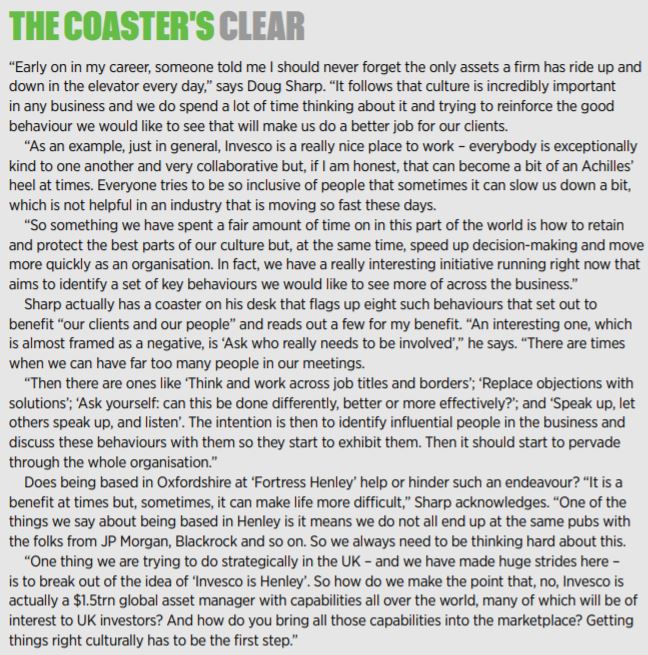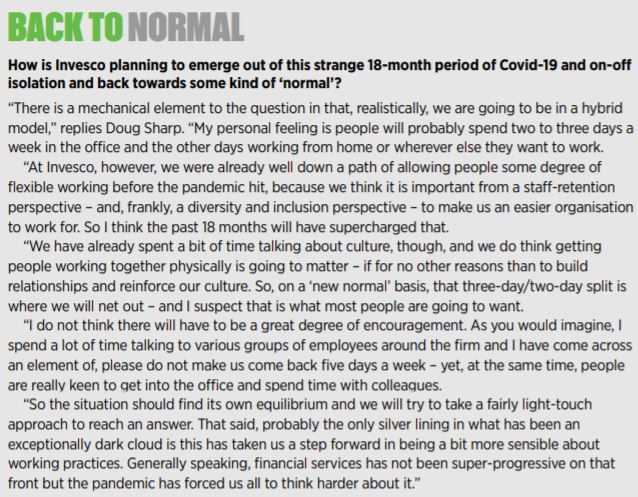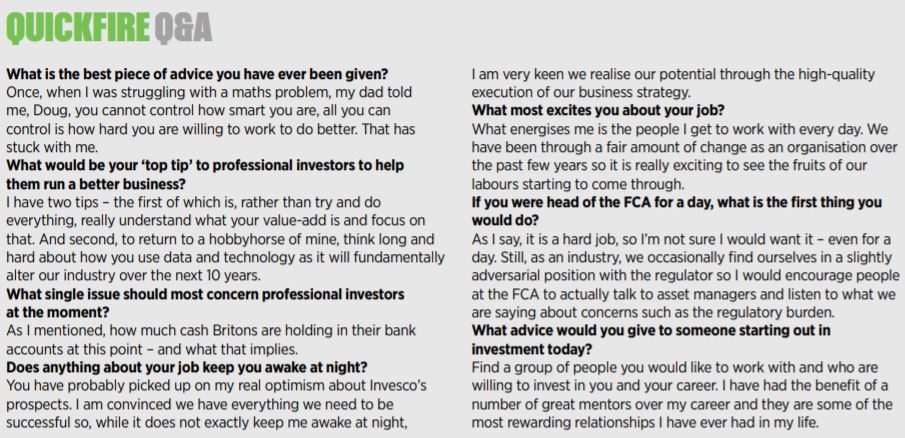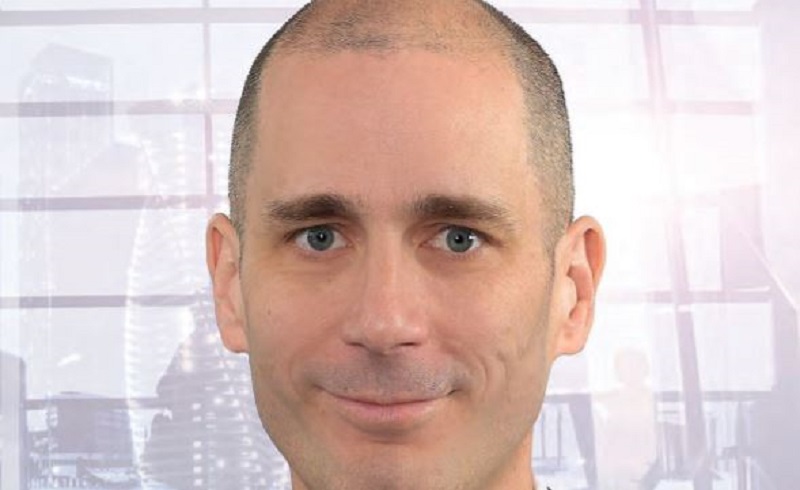“I read some interesting statistics the other day,” replies Doug Sharp, when asked what single issue should most concern professional investors at present. “Some £220bn has made its way into UK bank accounts since March of 2020 while, over the same period, we have seen just £10bn of net flows into the asset management sector. And, right now, UK savers are holding £2trn of cash – that is bigger than our entire industry.
“You have to ask what those numbers imply – and, specifically, what are we doing wrong as an industry that we are not engaging people? Every statistic you read suggests that people will be living on one third to a half of their pre-retirement income so how do we set about helping them understand the importance of taking a suitable amount of risk in exchange for better returns?
“Our industry has such an important role to play in terms of maintaining standards of living for people yet so many do not really understand what we do. That feels to me like an issue every adviser and every asset manager should be thinking about – how can we make investment more accessible for people and help them understand its importance?”
Ideas of co-operation, partnership and achieving closer working relationships – whether that be with advisers or end-investors – prove a constant theme during our conversation.
“The asset management sector is becoming a bit more democratised and that has to be a good thing,” says Sharp, who joined Invesco from consultant McKinsey & Co in 2008, becoming head of EMEA retail in 2015 and CEO of Invesco EMEA four years later.
“We have seen consolidation in the value chain, technology grow more powerful and clients become more educated, which means everyone has to be a lot more client-centric than before. There used to be a sense asset managers would create product and just push it through the chain but now there is a much deeper understanding of investor needs and building capability to target those needs. That has to lead to better outcomes for clients.”

Open questions
For Sharp, gaining a sense of what investors want involves “a lot of conversations with a lot of intermediary clients”.
“We have set up forums of clients where we just ask open questions about what they are hearing and what we could be doing better,” he continues. “The key is to be open to the feedback, take it on board and try and deliver against what we are hearing. Historically, that is not something our industry has been great at.”
General themes cropping up with increasing regularity in recent years include costs, environmental, social and governance (ESG) factors, use of technology and a rising sophistication across the entire value chain.
“The days of the broad-based, go-anywhere fund are increasingly over,” suggests Sharp. “The intermediary community now wants specific views on markets and specific investment strategies that align exactly with what they are trying to accomplish.”
Take ESG considerations, which Sharp estimates will take up around half of any given client meeting these days. “From a product development perspective, from an investment perspective and from a thought leadership perspective – for example, clients wondering how best to implement ESG in their portfolios and achieve influence – ESG is absolutely a theme,” he continues.
“You will not be surprised if I tell you we are taking ESG exceptionally seriously and it is probably the area where we are investing the most resources as an organisation at this point. We have put huge numbers of people into our centralised ESG team and all our investment teams are taking it really seriously, which five years ago, if we are honest, might not always have been the case in some areas.
“Now, though, everybody understands our clients want ESG so we have no choice but to do it – and to do it well. Delivering what it says on the tin is first and foremost what we aspire to as an organisation and ESG is no different. To the extent we say we have an ESG product, governance structures, investment risk structures, first and second lines of defence – everything is targeted around actually delivering to clients what we say we will.”

Tech forays
As for technology, while most asset management businesses will happily acknowledge their sector should be better harnessing its power, Invesco has not been shy to put its money where its mouth is. No stranger to buying the occasional investment house over the past two decades, it is the group’s forays into the technology sector – notably, its 2018 purchase of adviser tech platform Intelliflo – that have more recently caught the eye.
What is the company’s thinking here? “Over time, asset managers have become more and more distanced from the end-client – in effect, evolving into component-part providers to intermediaries and other advisers,” observes Sharp. “The question then becomes, how can we deepen our relationships with those clients? Since we bought Intelliflo in the UK, we have done a number of smaller, bolt-on acquisitions, principally in the US.
“Now Intelliflo executive chairman Nick Eatock is in the process of knitting it all together into a very slick – we would say industry-leading – end-to-end technology solution for advisers that will be able to do some pretty amazing things, both here and in the US. This is a work in progress – no doubt – but I am absolutely convinced that, done well, we can take a lot of adviser headaches out of the equation.
“Speaking to advisers, we are always hearing that, if they use a discretionary fund manager, say, the entire process can be very clunky and administrative. The strategic imperative for us then became how we could build solutions, put it in the technology and make it all straight-through processing so advisers do not have to worry about any of those things and can actually just focus on serving their clients.
“Intelliflo will remain open-architecture – it has to because that is a critical component of its business model. At Invesco, then, we view ourselves as a client and a partner for Intelliflo, as opposed to being any sort of ‘corporate heavy’ in the equation. We expect our ability to partner with the business will be incredibly powerful over time and the single biggest offering we are now in-market with is the model portfolio service.
Click of a button
“Simply put, this is an integrated solution that sits on Intelliflo’s technology while Invesco, in effect, builds model portfolios. Rather than an adviser having to do all the associated administration, everything happens at the click of a button. Our plan now is to add additional services in this vein that can really make the adviser experience much simpler, much straighter-through.”
Looking to the future, Sharp – not unexpectedly – sees technology continuing to democratise asset management. “It will allow for much more targeted outcomes – much more customisation – for consumers,” he predicts. “It depends how blue sky you want to go but you can imagine, through fractional share-dealing, tokenisation, blockchain and so on, being able to build ‘funds for one’ as an alternative to big pooled vehicles.
“It will be a great journey and it will take a while but this democratisation through technology could give people liquid access to real estate, to infrastructure, to private equity. The things we could be able to do with the technology, once it hits maturity, are going to be fascinating. It will fundamentally upend our industry – a challenge for advisers and firms like us but a game-changer for the end-investor.”
A more UK-specific asset management challenge Sharp sees is how Brexit ultimately plays out. “I would want to avoid the politics of that whole situation but it is well worth watching,” he argues. “You would probably point to the US and the UK as the two epicentres of global fund management so it will be interesting to watch if the UK can maintain its place there or if some market in continental Europe starts creeping up on it.”
Customer protection
Moving from Brexit to regulation, does Sharp believe the Financial Conduct Authority (FCA) has struck the right balance between the need to protect end-investors while offering some leeway to asset managers to do the best job they can? “Being a regulator in any industry is tough and the FCA has a really hard job,” he replies.
“For the most part, I would say it has the balance right. Arguably we hear more about customer protection in the UK than we do anywhere else in the world and that feels right – in some parts of the world, customers’ interests are not particularly well protected. As for whether the FCA gives us the space we need, well, we have the benefit of being a big global asset management firm with a lot of resources.
“An open question I would have is, if the FCA wants innovation to achieve better client outcomes, how do you balance the level of regulatory burden in the UK against a desire to attract more entrants and more innovation in the industry?
As I say, we have enough resources to bear the regulatory burden and get done what we need to get done. I am not certain small and mid-sized firms would necessarily say the same thing.”
Returning one last time to his themes of co-operation and partnership, Sharp concludes: “Occasionally, as an industry, we can find ourselves in a slightly adversarial position with the FCA. I fundamentally believe doing a great job by our clients is why most people in asset management come to work every day – yet sometimes I worry the FCA does not necessarily think that is a true statement.
“Nevertheless, I actually do think our incentives are all aligned – asset managers want to do a good job and we want to make sure consumers enjoy good outcomes, which is exactly what they want too.
“Far from being on opposite sides of the table, it more often feels like we are all sitting on the same side of the table – only perhaps with a different perspective.”

This article first featured in the September 2021 issue of Portfolio Adviser magazine.










